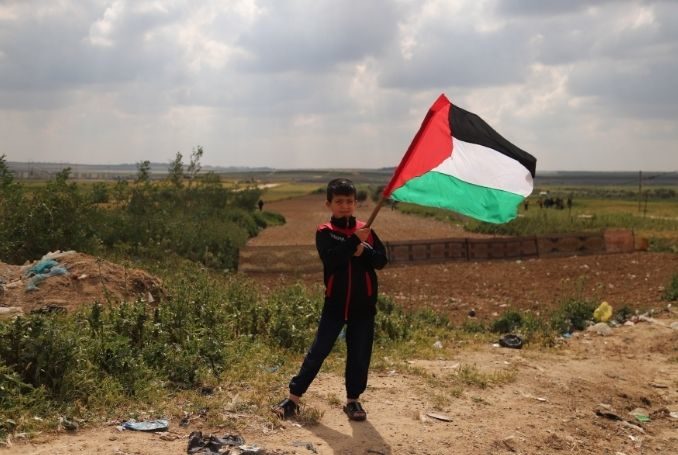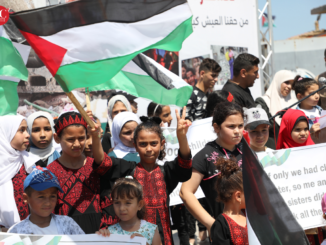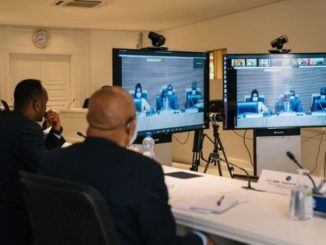
By Benay Blend
On March 30, 1976, Israeli police murdered six Palestinian civilians while they were protesting further expropriation of Palestinian land. Since that date, March 30 has been commemorated as Land Day, in honor of Indigenous sumud (resilience).
As Yara Hawari notes, it marks “an important event in the Palestinian collective narrative – one that emphasizes Palestinian resistance to Israeli colonization.” Hawari adds that the 1976 protests featured mass collective action that spanned across historic Palestine, a movement that resembled the more recent Unity Intifada not only in its breadth but also in its opposition to all settler colonial “policies of erasure.”
All of these features make Land Day an inspiration for other anti-colonial movements around the world. In Inter/Nationalism: Decolonizing Native America and Palestine (2016), Steven Salaita calls for “the ability (or willingness) of scholarship to influence decolonial advocacy” (x), scholarship that he envisions as “unburdened from the injunctions of objectivity” (x).
While the specificities of each situation remain important, it’s possible to equate Land Day with the Land Back movement in the Americas. All the more reason to link Land Day, along with its concomitant ongoing resistance, and Land Back as two examples of Indigenous struggles against their respective settler-colonial states.
In “Land Back and Revolutionary Socialism,” the Peoples’ Anti-Colonial Press (PA-CP) makes clear that the land back movement is part of global anti-imperialist struggles that include the Palestinian opposition to the settler-colonial Zionist regime.
In a critique of settler conservationism, Majerle Lister notes that it plays a dual role by erasing Indigenous presence from the land while conserving it for the good of the settler public. While non-profits such as the Sierra Club see this as a step in the right direction, Native activists, such as Lister, are calling for land back to Indigenous people.
In Sheikh Jarrah, where Palestinians recently protested eviction that was to make way for settler families, another case arose in November 2021 calling for expropriation of land to clear space for a garden next to a planned hotel. While this might not fall under the same rubric as conservation, it nevertheless demonstrates the need for land back in Palestine as well as an end to the occupation.
On Land Day, it’s important to emphasize that all land back movements should be Indigenous-led. PA-CP explains the problems that arose In Canada from “reconciliation” with the settler-colonial state and perhaps by proxy the non-profit industrial complex. It [reconciliation] “can be seen as an attempted reform of the settler-colonial state and a new strategy in its management of, and governance over, colonized Indigenous nations.”
Moreover, reconciliation assumes, continues PA-CP, that there was/is an acceptable relationship between indigenous peoples and the state; that all harm that was done remains in the past; that “simple policy changes” can serve to redress Indigenous demands; and that Indigenous “futures on [the] land should remain within the jurisdiction of the state.”
While the above analysis was written to critique official “Truth and Reconciliation” efforts in Canada, it holds true for any such effort that seeks to erase unequal power dynamics between oppressor and oppressed. For example, on March 2, 2022, Combatants for Peace (CFP) plans an online conversation entitled “Sheikh Jarrah and the Future of Jerusalem.”
Although CFP has called its presence in Sheikh Jarrah a peace-keeping force that bears witness, its project is still one of normalization as it sets the parameters for action. It sees itself as a “strong, significant, influential bi-national community – a community that exemplifies viable cooperation and coexistence between Palestinians and Israelis. It is a movement based upon nonviolent activism” that focuses on cooperation and co-existence.
In those words, it rules out any other form of resistance, denying Palestinians their legal right to resist occupation by any means they chose. As a leading Palestinian youth activist put it: “the only normal relationship between those from the oppressor community and those from the oppressed community is co-resistance, not co-existence. Co-existence can only happen (ethically speaking) after the end of oppression, when both sides can enjoy equal rights.”
Finally, Land Back along with Land Day goes beyond territorial claims. It also includes food sovereignty, the right to feed the population not only with healthy but also with Indigenous-sourced foods. From community gardens that focus on non-GMO heirloom seeds to Vivien Sansour’s Seed Library, all are fighting against forces that threaten farmers’ right to grow healthy, sustainable crops.
As Sansour explains, the seeds that she works to preserve “carry the DNA of our survival” despite the Occupation’s violence, including both direct physical harm as well as chemical warfare sprayed on Palestinian land. “Heirloom seeds tell us stories,” she continues, “connect us to our ancestral roots, remind us of meals our families made at special times of the year.”
The Palestine Heirloom Seed Library (PHSL) is an effort to return the seeds’ stories back to their rightful people, a place where seeds are viewed as “subversive rebel[s],” an accomplice that crosses “borders and checkpoints to defy the violence of the landscape while reclaiming life and presence.” They become an avatar who stakes out space willing its people to follow.
When Asantewaa (Mawusi) Nkrumah-Ture, Philadelphia-based activist and long-time anti-Zionist friend of Palestine, won a restraining order against the new owners of her rental house who were attempting an illegal move-in eviction, she told the crowd gathered at her press conference: “When we ORGANIZE we win!”
Her mantra has been born out in Palestine. Writing on “Palestine’s Everyday Victories,” Ramzy Baroud reveals that Israel’s Nature and Park Authority has revoked a plan that would have illegally appropriated church-owned lands in the Mount of Olives in occupied Palestinian East Jerusalem. Not only did Palestine garner local support but activists also worked to organize internationally against Israel’s “latest colonizing scheme.”
This “everyday victory,” Baroud concludes, provides proof that “resistance works,” especially when the struggle becomes global. Linking Palestine’s decades-long anti-colonial opposition with such movements everywhere keeps that struggle in the limelight, thus perhaps exposing the double standards that Illan Pappe notes in mainstream coverage of the Ukraine/Russia war.
While mourning the situation in the Ukraine, Pappe points out that such solidarity in the West is reserved for allies who are under its sphere of influence. When non-Europeans, in particular Palestinians, are under similar attack they are often blamed for their own victimhood.
“Legitimizing internationally the invasion of sovereign countries and licensing the continued colonization and oppression of others,” he concludes, “such as Palestine and its people, will lead to more tragedies, such as the Ukrainian one, in the future, and everywhere on our planet.”
For this reason, Palestine should always be brought into conversations that encompass justice. “As an anti-imperial struggle,” writes Palestine Youth Movement, “ Palestine and Palestinians resist in direct opposition to the global imperial order and balance of power that the US, EU, and NATO are seeking to preserve.”
On Land Day, a commemoration of activists who were murdered for desiring sovereignty over their land, there is no more essential time than the present to make their struggle global.

– Benay Blend earned her doctorate in American Studies from the University of New Mexico. Her scholarly works include Douglas Vakoch and Sam Mickey, Eds. (2017), “’Neither Homeland Nor Exile are Words’: ‘Situated Knowledge’ in the Works of Palestinian and Native American Writers”. She contributed this article to The Palestine Chronicle.







